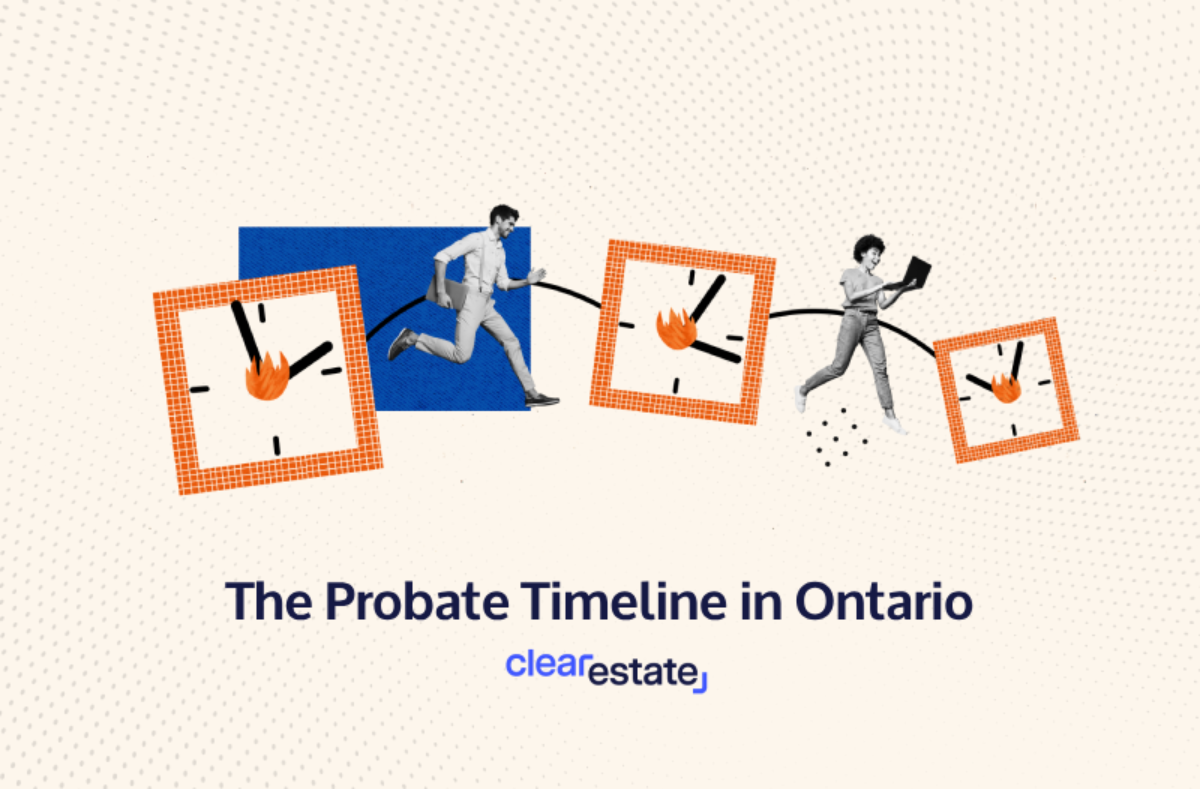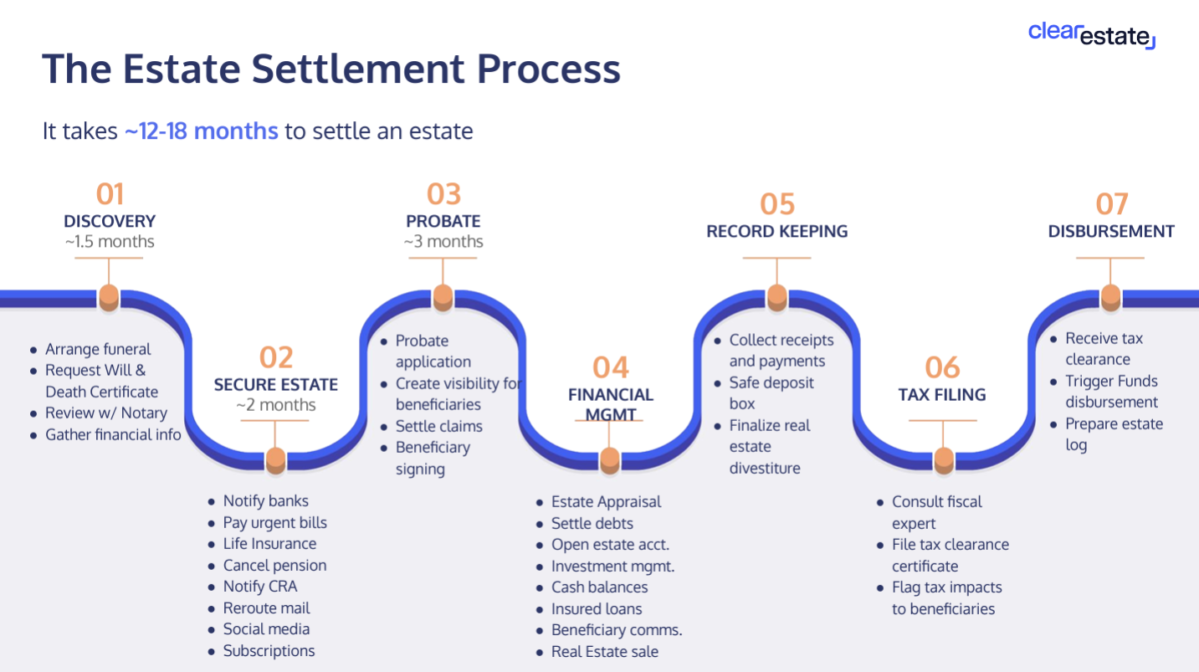Estate Settlement
Dec 04, 2024
How Do Executors Mail Inheritance Checks?
Find out how inheritance checks are mailed, including security measures and what to do if there are delays in receiving them.
Probate in Ontario typically takes 8-12 months. Discover the complete timeline from court process to estate settlement, and factors affecting probate duration.


The probate process in Ontario, from initial application to final distribution and estate closure, typically takes between 8 to 12 months to complete.
The process involves two main phases:
Let's break this down further to understand why the process takes this long and what it entails.
A quick google search for probate timelines often leads to conflicting information, most indicating 6-8 weeks to complete probate..which for most estate's isn't the case.
Here's why:
Many sources claim probate in Ontario takes only 6 to 8 weeks. This is misleading because:
In reality, the complete probate process in Ontario typically takes 8 to 12 months. This extended timeline is crucial for both executors and beneficiaries to understand, as it helps set realistic expectations. Let's break down this process step by step:
Understanding this timeline helps all parties involved in the probate process set realistic expectations. While the official court process might only take 6-8 weeks, the entire settlement process typically extends to 8-12 months or even longer in complex cases.

The duration of the probate process in Ontario can vary significantly depending on several key factors. From our own evidence, these factors below are what prominently affect the timeline of probate:
The location of the court handling your probate application can have a substantial impact on processing times. Smaller courts, such as those in Kitchener, may process applications in as little as 24-48 hours. In contrast, larger courts like those in Toronto typically take 4-6 weeks, and during busy periods, this can extend to 3-5 months.
Court capacity plays a crucial role in these timelines. Busier courts naturally have longer processing times, and external factors such as public health crises can significantly impact court operations, further extending timelines.
The complexity of the estate is another major factor in determining the length of the probate process. Simple estates with straightforward assets may be processed relatively quickly. However, complex estates can take significantly longer, especially if they include multiple properties, business assets, collectibles requiring professional valuation, or international assets. Each of these elements adds layers of complexity that require additional time to process and evaluate.
The availability of crucial documents can either expedite or delay the probate process. Missing documents, such as the original will or life insurance policies, can add weeks or even months to the timeline. It's crucial to start gathering all necessary documents as soon as possible to avoid these delays.
Conflicts among beneficiaries or challenges to the will's validity can extend the probate process by months or even years. Common disputes include allegations of undue influence, questions about testamentary capacity, and disagreements over will interpretation. These issues often require legal intervention and can significantly prolong the probate process.
Errors in the probate application can lead to significant delays. Common mistakes include incorrect asset valuations, missing signatures, and incomplete information about beneficiaries. Each error typically requires correction and resubmission, adding time to the process. Ensuring accuracy in the initial application is crucial for a smooth probate process.
Settling outstanding debts and taxes is a critical step that must be completed before the distribution of assets. Complex tax situations, particularly in estates with businesses or complex investments, can add months to the process. These estates often require more time for proper tax planning and settlement, involving coordination with tax professionals and potentially the Canada Revenue Agency.
The cooperation of beneficiaries can significantly impact the timeline. Delays in obtaining necessary signatures or information from beneficiaries can extend the process. This is particularly challenging in intestate situations (where there is no will) or when dealing with international beneficiaries. Clear communication and prompt responses from all involved parties can help mitigate these delays.
Understanding these factors can help executors and beneficiaries navigate the probate process more effectively. While some factors may be beyond your control, being aware of potential complications can help you prepare and, where possible, take steps to minimize delays.
If you're a beneficiary, it's important to understand that the process takes time. Here's what you should know:
Executors are responsible for settling an estate within a certain timeframe, usually within one year of the death of the person who left the will. In some cases, it may take longer than a year to settle an estate if the estate is complex or if there are disputes among beneficiaries.
If you're an executor, keep in mind the deadline and take actions to settle the estate as quickly as possible. This includes paying any outstanding debts and taxes from the estate, distributing assets to heirs according to the will, and finalizing all the actions instructed by the deceased will.
If you are an heir, be patient as the executor closes the estate. You should contact the executor to find out about the state of the estate and when you can expect to receive your inheritance.
The executor of an estate is responsible for ensuring that all debts and taxes are paid for by the estate before any funds can be distributed to beneficiaries.
Once all the required payments have been made, the executor can distribute the remaining funds according to the will.
In Ontario, it usually takes about 2 to 3 months after probate is granted for the executor to finalize all payments and distribute the funds to beneficiaries.
If you are a beneficiary of an estate, you should contact the executor to find out when you can expect to receive your inheritance.
It is important to note that the executor is not required to distribute the funds immediately after probate is granted. In some cases, it may take several months for the executor to finalize all the payments and distribute the funds to beneficiaries.
If you are an executor or beneficiary of an estate and would like to check the status of your probate case, you can contact the court where the will was filed.
The court staff can provide you with information on the progress of the case and when you can expect to receive a decision from the court.
Alternatively, you can check the online court registry to see if there is any information about your probate case.
If you cannot find any information about your case, it is possible that the probate process has not yet begun or that the will has not been filed with the court. In this case, you should contact the executor of the estate to find out more information.
Overall, the probate process can take several months to complete. The exact timeline will vary depending on the size and complexity of the estate, as well as any disputes that may arise.It's critical for an executor to keep beneficiaries informed about the progress of the probate procedure and aware of the anticipated timetable.
If you are an heir or beneficiary, be patient and contact the executor for more information. You can also check the online court registry or contact the court where the will was filed to get more information about your specific case.
Understanding the real timeline of probate in Ontario is crucial for both executors and beneficiaries. While often misrepresented as a quick 6-8 week process, the reality is that probate typically takes 8-12 months from start to finish. This extended timeline encompasses not just the court process, but also the complex tasks of asset valuation, debt settlement, tax filing, and final distribution. Factors such as estate complexity, court location, and potential disputes can further extend this timeline.
At ClearEstate, we specialize in streamlining the probate process, helping executors fulfill their duties efficiently and beneficiaries understand their rights. Our experienced team can help minimize delays, avoid common pitfalls, and potentially speed up the probate process.
Ready to ease your probate journey?
Book a free consultation with us today. We'll review your specific situation, answer your questions, and provide tailored guidance on how to navigate probate as smoothly as possible.
 Simplify Probate Today
Simplify Probate Today
Get expert guidance from our probate specialists who've helped 10,000+ families.
Book a free consultation today